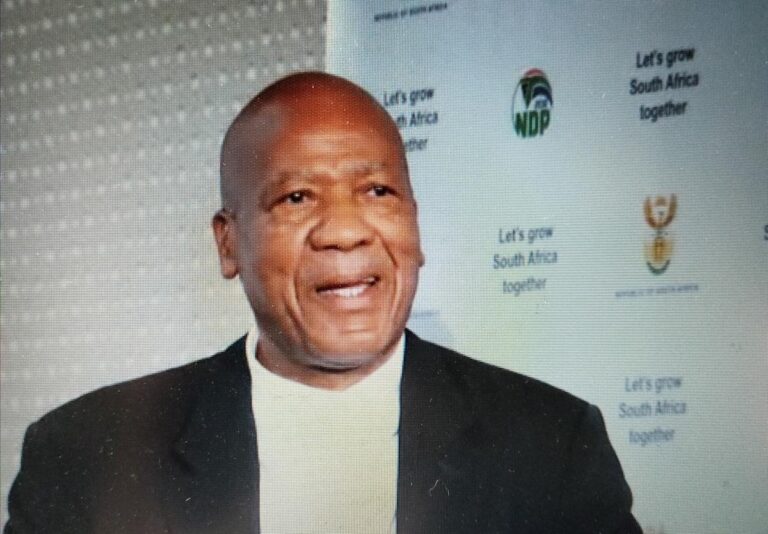
Photo: Health Ombudsman, Prof Malegapuru Mokgoba at the release of his report on conditions at RMMCH
The investigation started in April last year after a member of Parliament’s Health Portfolio Committee lodged a complaint with the Health Ombud about the conditions at the facility.
Soon afterwards, RMMCH was catapulted into the public eye with a video that circulated on social media showing heavily pregnant women sleeping on the hospital floors. This was followed by an open letter to the Department of Health by paediatric gastroenterologist, Dr Tim de Maayer in which he exposed the horrific conditions at the hospital, causing his much-publicised suspension and subsequent reinstatement.
Reading like a horror story, the report corroborates complaints by patients and doctors working at the facility of a dirty, filthy, unsafe and overcrowded hospital led by a seemingly incompetent CEO who spent more time at home than at the hospital. It also revealed that a staff member responsible for theatres mixed her own concoctions when medicine stocks ran out, leading to infections.
Expressing his shock at the conditions that the investigating team found during a site visit including patients sleeping on the floor, seeping sewerage, broken pipes and filthy toilets, Prof Makgoba, related his experiences as a medical student when Rahima Moosa, then called Coronation Hospital, was one of the most sought-after training- and treating hospitals in the country.
Prof Mokgoba also referred to a detailed report compiled by Profs Ashraf Coovadia and Hennie Lombaard in 2017 titled “An Unsafe Hospital” of which the recommendations on how the problems should be addressed, were never considered or implemented.
During the Health Ombuds investigation, 34 people were interviewed including Dr de Maayer and some of his colleagues that provided “irrevocable evidence of the complaints received,” Prof Makgoba said.
The main findings of the report include that:
- Heavily pregnant women were expected to sleep on the floor because of a lack of beds.
- That the then-CEO, Dr Nokuza Mkabayi spent 182 working days away from the hospital in the two years she was working there. Records from the hospital’s human resources showed that in 2021, 27 of those days were unaccounted for and in 2022, 72 days. Dr Mkabayi has since been moved from to the Department of Health’s headquarters and is receiving treatment after she engaged with the HPCSA on her condition that is allegedly linked to stress.
- That the dignity of women was not taken care of.
- That there were several lapses in the appointment of CEOs at the hospital, including that they were appointed despite not meeting the criteria for the job.
- That despite the hospital being accredited as a specialised healthcare facility, it didn’t have crucial resources such as an Intensive Care Unit, laboratory services and a blood bank while crucial equipment such as its CAT scan machine was not working.
- That nosocomial Infections were common, mainly due to staff shortages, overcrowding, and poor hand hygiene.
- That a ‘self-made’ concocted solution used to prepare the skin before abdominal surgical procedures in August 2022 contributed to at least 11 ‘relook’ surgeries.
- That there were supply management challenges that are related to corruption.
- That 40% of the patients treated at RMMCH were not South African citizens.
“During the investigation, the most striking thing has been the fact that the hospital has been neglected to such an extent, in almost all respects, for several years. Senior managers were found to exhibit a significant lack of discipline and manipulative behaviours, while the callousness and apparent disregard for human safety is chilling which is evident in the dire lack of resources for a hospital providing critical tertiary level specialist services in the 21st century,” Prof Mokgaba noted.
“Overall, the Gauteng Health Department is in a mess and the criteria used by the department to select hospital CEOs are far below the required standard for such senior positions and monitoring and evaluation systems are weak,” he added.
Recommendations
Recommendations in the report include that the Premier should ensure that RMMCH is one of the first hospitals to be refurbished and that immediate consideration should be given to the collapsing sewage system, leaking steam pipes, dilapidated buildings, and unkempt surrounding areas within the hospital perimeter. It is also advised that the GDoH and the hospital institute a disciplinary inquiry against the former CEO for her failure to ensure that functional systems were in place, flouting standard HR practices and failure to manage her leave according to her legal obligations.
Other recommendations include:
- That a suitable, and permanent CEO for RMMCH is identified and appointed as a matter of priority, within three months and that the advertisement for the post should be in line with standardised requirements for CEOs of regional and tertiary level hospitals to ensure that potential candidates meet all the relevant criteria and are ‘fit for purpose’.
- That the GDoH should prioritise and fast-track the gazetting of RMMCH as a rertiary hospital which would ensure that RMMCH receives a tertiary grant, within eight months.
- That the MEC of Health urgently appoint an independent forensic and audit firm to conduct a competency, ‘fit for purpose’ assessment of the leadership and management staff at RMMCH and start with the upskilling of managers.
- And that the 2017 report on the RMMCH should be revisited to implement the recommendations as matter of urgency.
A comprehensive implementation plan is to be submitted to the Ombudsman within six months providing detailed realistic strategies, time frames, and names, designations and contact details of persons responsible for implementation.
Speaking after the media briefing, Gauteng Health MEC Nomantu Nokomo-Ralehoko welcomed the release of the report and said she was studying it to consolidate an implementation plan to address the issues raised by the Ombudsman.